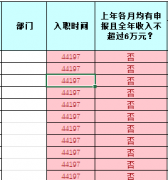问题描述
我正在使用 MariaDB 的 COLUMN_JSON() 功能.正如 this bug 所示,该函数可以正确转义双引号,但不能转义其他字符被编码/转义.
I'm using MariaDB's COLUMN_JSON() function. As this bug illustrates, the function properly escapes double quotes, but not other characters that should be encoded/escaped.
这是一个愚蠢的示例查询,用于演示如何创建 JSON 列.
Here's a silly example query to demonstrate how the JSON column is created.
SELECT CONCAT('[', GROUP_CONCAT(COLUMN_JSON(COLUMN_CREATE(
'name', `name`,
'value', `value`
)) SEPARATOR ','), ']') AS `json`
FROM `settings`
如果 name 或 value 包含无效的 JSON 字符,json_decode 将失败.
If the name or value contain invalid JSON characters, json_decode will fail.
我编写了一个 PHP 函数来转义/编码来自查询的值,但似乎应该有更好的方法.
I've written a PHP function to escape/encode the value that comes from the query, but it seems like there should be a better way.
/**
* Makes sure the JSON values built by COLUMN_JSON() in MariaDB are safe for json_decode()
* Assumes that double quotes are already escaped
*
* @param string $mysql_json
* @return string
*/
public static function jsonEscape($mysql_json)
{
$rtn = '';
for ($i = 0; $i < strlen($mysql_json); ++$i) {
$char = $mysql_json[$i];
if (($char === '\') && ($mysql_json[$i + 1] !== '"')) {
// escape a backslash, but leave escaped double quotes intact
$rtn .= '\\';
} elseif (($ord = ord($char)) && ($ord < 32)) {
// hex encode control characters (below ASCII 32)
$rtn .= '\u' . str_pad(dechex($ord), 4, '0', STR_PAD_LEFT);
} else {
$rtn .= $char;
}
}
return $rtn;
}
像这样逐个字符地检查字符串效果不佳.也许有一个字符串替换或正则表达式会更高效?
Examine the string character-by-character like this doesn't perform well. Perhaps there's a string replacement or regular expression that would be more performant?
推荐答案
根据 Halcyon 的评论,我切换了str_replace() 解决方案,它的表现要好得多!trim(json_encode(13), '"') 和 '\u' . str_pad(dechex(13), 4, '0', STR_PAD_LEFT) 稍微好一点,但它使意图更加清晰.
Based on a comment from Halcyon, I switched to a str_replace() solution, and it performs much better! The performance difference between trim(json_encode(13), '"') and '\u' . str_pad(dechex(13), 4, '0', STR_PAD_LEFT) is just barely better, but it makes the intent more clear.
private static $json_replace_search;
private static $json_replace_replace;
/**
* Makes sure the JSON values built by GROUP_CONCAT() and COLUMN_JSON() in MariaDB are safe for json_decode()
* Assumes that double quotes are already escaped
*
* @param string $mysql_json
* @return string
*/
public static function jsonEscape($mysql_json)
{
if (is_null(self::$json_replace_search)) {
// initialize
self::$json_replace_search = [];
self::$json_replace_replace = [];
// set up all of the control characters (below ASCII 32)
for ($i = 0; $i < 32; ++$i) {
self::$json_replace_search[$i] = chr($i);
self::$json_replace_replace[$i] = trim(json_encode(self::$json_replace_search[$i]), '"');
}
}
// replace them
return str_replace(self::$json_replace_search, self::$json_replace_replace, $mysql_json);
}
/**
*
* @param string $mysql_json
* @return mixed
*/
public static function jsonDecode($mysql_json)
{
return json_decode(self::jsonEscape($mysql_json));
}
这篇关于编码/转义 JSON 控制字符的文章就介绍到这了,希望我们推荐的答案对大家有所帮助,也希望大家多多支持跟版网!



 大气响应式网络建站服务公司织梦模板
大气响应式网络建站服务公司织梦模板 高端大气html5设计公司网站源码
高端大气html5设计公司网站源码 织梦dede网页模板下载素材销售下载站平台(带会员中心带筛选)
织梦dede网页模板下载素材销售下载站平台(带会员中心带筛选) 财税代理公司注册代理记账网站织梦模板(带手机端)
财税代理公司注册代理记账网站织梦模板(带手机端) 成人高考自考在职研究生教育机构网站源码(带手机端)
成人高考自考在职研究生教育机构网站源码(带手机端) 高端HTML5响应式企业集团通用类网站织梦模板(自适应手机端)
高端HTML5响应式企业集团通用类网站织梦模板(自适应手机端)